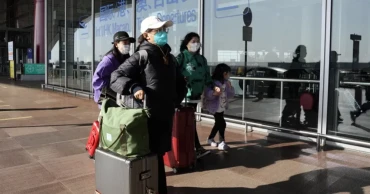Covid-19 testing
Travelers from China will need to undergo COVID-19 testing in the US
The U.S. announced new COVID-19 testing requirements Wednesday for all travelers from China, joining other nations imposing restrictions because of a surge of infections.
The increase in cases across China follows the rollback of the nation's strict anti-virus controls. China's “zero COVID” policies had kept the country's infection rate low but fueled public frustration and crushed economic growth.
The new U.S. requirements, which start Jan. 5, apply to travelers regardless of their nationality and vaccination status.
In a statement explaining the testing, the U.S. Centers for Disease Control and Prevention cited the surge in infections and what it said was a lack of adequate and transparent information from China, including genomic sequencing on the viral strains circulating in the country.
“These data are critical to monitor the case surge effectively and decrease the chance for entry of a novel variant of concern,” the CDC said.
Also read: China to resume issuing passports, visas as virus curbs ease
Some scientists are worried the COVID-19 surge in China could unleash a new coronavirus variant on the world that may or may not be similar to the ones circulating now. That’s because every infection is another chance for the virus to mutate.
“What we want to avoid is having a variant enter into the U.S. and spread like we saw with delta or omicron,” said Matthew Binnicker, director of clinical virology at Mayo Clinic in Rochester, Minnesota.
But the CDC's action may be less about stopping a new variant from crossing U.S. borders and more about increasing pressure on China to share more information, said Dr. David Dowdy, an infectious disease epidemiologist at Johns Hopkins Bloomberg School of Public Health, adding he hopes the restrictions "aren’t kept in place longer than they need to be.”
“I don’t think it’s going to have a major impact in slowing the spread of COVID-19,” Dowdy said. “We have a whole lot of transmission of COVID-19 here within our borders already.”
Dr. Stuart Campbell Ray, an infectious disease expert at Johns Hopkins University, agreed China isn't sharing enough genomic sequencing information. But he also said the U.S. has become a little complacent about sequencing and needs to redouble its own efforts. The CDC also announced the expansion of an early warning program that tests volunteers at select airports for new and rare variants of the coronavirus. That program will expand to airports in Seattle and Los Angeles.
Under the new U.S. rules, travelers to the U.S. from China, Hong Kong and Macau, will be required to take a COVID-19 test no more than two days before travel and provide a negative test before boarding their flight. The testing applies to anyone 2 years and older, including U.S. citizens.
It will apply to people traveling from China via a third country and to people connecting through the U.S. as they go on to other destinations. Anyone testing positive more than 10 days before the flight can provide documentation showing they’ve recovered from COVID-19 instead of a negative test result.
It will be up to the airlines to confirm negative tests and documentation of recovery before passengers board.
Other countries have taken similar steps in an effort to keep infections from spreading beyond China's borders. Japan will require a negative COVID-19 test upon arrival for travelers from China, and Malaysia announced new tracking and surveillance measures. India, Italy, South Korea and Taiwan are requiring virus tests for visitors from China.
Lunar New Year, which begins Jan. 22, is usually China's busiest travel season, and China announced Tuesday it will resume issuing passports for tourism for the first time since the start of the pandemic in 2020.
“We look forward to welcoming Chinese travelers back to the United States,” U.S. Travel Association President and CEO Geoff Freeman said in a statement. He called the U.S. approach to testing inbound travelers “reasonable and appreciated.”
The U.S. action is a return to testing requirements for some international travelers. The Biden administration lifted the last of such mandates in June. At that time, the CDC continued to recommend that people boarding flights to the U.S. get tested close to departure time and not travel if they are sick.
“We’ve done this before. We can do it again,” Dowdy said.
Early in the pandemic, the U.S. barred entry to foreigners traveling from China, weeks after the virus first emerged there three years ago, and dozens of other countries were added to the list. The country started lifting travel bans late last year, but required travelers to the U.S. to be vaccinated and tested.
3 years ago
New tests to decide Shanghai reopening as Beijing stocks up
Shanghai authorities said new COVID-19 testing over the next few days will determine which neighborhoods can safely start reopening, as residents in Beijing watched carefully for word for whether the capital will lock down.
On Wednesday, China reported 14,222 new cases of coronavirus infection, the vast majority in people not showing symptoms.
Shanghai residents will begin another round of testing over the next few days and areas that have achieved “societal zero COVID” could see some measure of limited freedom, the vice head of the city health committee, Zhao Dandan, said.
China’s zero-COVID strategy is being tested by the country’s largest outbreak of the pandemic, which began in the central city of Wuhan in late December 2019. The phrase refers to new infections being detected only in people already under surveillance, such as those in a centralized quarantine facility or known close contacts of existing patients, and the virus is no longer being spread in the community.
Shanghai’s lockdown began a month ago, taking a toll on residents confined to their homes. While a small, lucky portion of people have been allowed to leave their homes in the past week, the vast majority of people remain confined.
The flow of industrial goods has also been disrupted by the suspension of access to Shanghai, home of the world’s busiest port, and other industrial cities including Changchun and Jilin in northeast China.
Officials reported 48 deaths on Wednesday, bringing the total to at least 238 in the city.
Meanwhile, the capital Beijing is in the middle of mass testing millions of residents after discovering a cluster of cases last week. The city reported 34 new cases Wednesday, three of them in people showing no symptoms.
In the last couple of days, nervous Beijing residents had started stockpiling food and supplies, following Shanghai’s troubles where residents struggled to get a continuous and reliable supply of food while under lockdown.
Also read: Surprisingly low Shanghai COVID death count spurs questions
Beijing city officials were quick to promise that they were ensuring grocery stores would be well-stocked. They said they were monitoring the Xinfadi wholesale market, where the city gets the vast majority of its supplies.
Demand has soared, with city residents sharing online lists of what to stock. Farms on the outskirts of Beijing told the official Beijing Daily News that April and May are typically when demand peaks. Compared to the same period last year, the number of orders rose 20%, owing to the demand generated by the epidemic, according to one major farm the paper interviewed.
Another farm said it was even more. “Starting from yesterday, the number of orders we’ve received have clearly increased, roughly double the amount at this time last year,” supply chain manager Zhang Xinming told Beijing Daily News.
So far, officials have locked down only specific areas of Beijing where virus cases were found. On Wednesday, the Tongzhou district suspended classes for all its schools from kindergarten through high school.
Given that China for now remains committed to its “zero-COVID” approach, “I do think we will continue to see the use of these lockdowns across the country,” said Karen Grepin, a public health expert at the University of Hong Kong. “If anything, the omicron variant has made it more challenging to control the virus and thus more stringent measures are needed if the goal is to continue to strive for local elimination.”
The “zero-COVID” strategy has worked well against previous versions of the virus, keeping China mostly virus-free for two years as the pandemic spread around the world. Questions are being raised about its effectiveness now, with vaccines protecting most people from serious illness and the immense challenge of trying to contain the more transmissible omicron variant.
3 years ago
Shanghai seeks ‘societal zero COVID’ with rounds of testing
Shanghai city authorities said Wednesday they will start rounds of COVID-19 testing over the next few days to determine which neighborhoods can safely be allowed a limited amount of freedom of movement, as residents in Beijing watch carefully on word for whether the capital city will lock down.
On Wednesday, China reported 14,222 new cases, the vast majority of which were asymptomatic. The country is battling its largest outbreak since the pandemic was first reported in Wuhan in late December 2019.
Shanghai’s vice head of its health committee, Zhao Dandan, announced Wednesday that the city would begin another round of testing for city residents over the next few days to determine which districts were lower risk. Areas that have been declared to have achieved “societal zero COVID” could see some measure of limited freedom.
Also read: Surprisingly low Shanghai COVID death count spurs questions
The phrase, used by Chinese health authorities, refers to when new positive cases are only discovered in people who are already under surveillance, such as in centralized quarantine or those considered to be close contacts. At this point, they are considered to have broken off chains of transmission at the community level.
Shanghai’s total lockdown has been in place for near a month, taking a toll on residents who have been confined to their homes. While a small, lucky portion of people have been allowed to leave their homes in the past week, the vast majority of people remain confined.
The flow of industrial goods has also been disrupted by the suspension of access to Shanghai, home of the world’s busiest port, and other industrial cities including Changchun and Jilin in northeast China.
Officials reported 48 deaths on Wednesday, bringing the total to at least 238 in the city.
Meanwhile, the capital city Beijing is in the middle of mass testing millions of residents after cases were discovered over the weekend. The city reported 34 new cases Wednesday, 3 of which were asymptomatic.
In the last couple of days, nervous Beijing residents had started stockpiling food and supplies, following Shanghai’s troubles where residents struggled to get a continuous and reliable supply of food while under lockdown.
Beijing city officials were quick to promise that they were ensuring grocery stores would be well-stocked. They said they were monitoring the Xinfadi wholesale market, where the city gets the vast majority of its supply from, at a press conference Tuesday night.
Demand has soared, with city residents sharing online lists of what to stock. Farms on the outskirts of Beijing told the official Beijing Daily News that April and May are typically when demand peaks. Compared to the same period last year, the number of orders rose 20%, owing to the demand generated by the epidemic, according to one major farm the paper interviewed.
Also read: Shanghai reports 1st deaths from current COVID-19 outbreak
Another farm said it was even more. “Starting from yesterday, the number of orders we’ve received have clearly increased, roughly double the amount at this time last year,” supply chain manager Zhang Xinming told Beijing Daily News.
It is unclear whether the entire city will be forced under lockdown. For now, officials have locked down only specific areas where positive cases were found. On Wednesday, Beijing’s Tongzhou district suspended classes for all its schools from kindergarten through high school.
Given that China for now remains committed to its “zero-COVID” approach, “I do think we will continue to see the use of these lockdowns across the country,” said Karen Grepin, a public health expert at the University of Hong Kong. “If anything, the omicron variant has made it more challenging to control the virus and thus more stringent measures are needed if the goal is to continue to strive for local elimination.”
The “zero-COVID” strategy has worked well against previous versions of the virus, ensuring that for most of the past two years, people in China were able to live a mostly virus-free life.
3 years ago
Much of Shanghai locked down as mass COVID-19 testing begins
China began locking down most of its largest city of Shanghai on Monday as a coronavirus outbreak surges and amid questions about the economic toll of the nation's “zero-COVID” strategy.
Shanghai's Pudong financial district and nearby areas will be locked down from early Monday to Friday as citywide mass testing gets underway, the local government said. In the second phase of the lockdown, the vast downtown area west of the Huangpu River that divides the city will then start its own five-day lockdown Friday.
Read: India reports 1,660 new COVID-19 cases
Residents will be required to stay home and deliveries will be left at checkpoints to ensure there is no contact with the outside world. Offices and all businesses not considered essential will be closed and public transport suspended.
Already, many communities within the city of 26 million have been locked down, with their residents required to submit to multiple tests for COVID-19. And Shanghai’s Disney theme park is among the businesses that closed earlier.
Shanghai detected another 3,500 cases of infection on Sunday, though all but 50 were people who tested positive but were not showing symptoms of COVID-19. China categorizes such cases separately from “confirmed cases” — those in people who are sick — leading to much lower totals in daily reports.
China has reported more than 56,000 infections nationwide this month, with a surge in the northeastern province of Jilin accounting for most of them.
In response to its biggest outbreak in two years, China has continued to enforce what it calls the “dynamic zero-COVID" approach, calling that the most economical and effective prevention strategy against COVID-19.
That requires lockdowns and mass testing, with close contacts often being quarantined at home or in a central government facility. The strategy focuses on eradicating community transmission of the virus as quickly as possible, sometimes by locking down entire cities.
While officials, including Communist Party leader Xi Jinping have encouraged more targeted measures, local officials tend to take a more extreme approach, concerned with being fired or otherwise punished over accusations of failing to prevent outbreaks.
With China’s economic growth already slowing, the extreme measures are seen as worsening difficulties striking employment, consumption and even global supply chains.
Read: Global Covid cases top 480 million
While China's vaccination rate is around 87%, it is considerably lower among older people.
National data released earlier this month showed that over 52 million people aged 60 and older have yet to be vaccinated with any COVID-19 vaccine. Booster rates are also low, with only 56.4% of people between 60-69 having received a booster shot, and 48.4% of people between 70-79 having received one.
3 years ago
DGHS closes 11 private Covid testing booths in Rooppur due to irregularities
Citing unequal competition and irregularities among the 11 approved private Covid-19 testing booths in the Rooppur Nuclear Power Plant project area in Pabna, the Directorate General of Health Services (DGHS) announced them closed on Tuesday.
The 11 private organizations were mainly collecting samples of officials, workers of different organizations of the project and some general people of the district for testing of Covid-19.
The organizations were granted permission by a private organization named DNA Solution Ltd and by the Pabna Civil Surgeon office to conduct sample tests in the project area on certain conditions.
On July 18, the DGHS Director Dr Md Farid Hossain Mia sent a letter to the Pabna Civil Surgeon that said some of the organizations permitted by Dhaka based DNA solution and the Civil Surgeon Office are collecting samples from the area and taking them to test in Dhaka’s RT-PCR lab.
Read: DGHS to private labs: Suspend sample collection booths outside hospitals
Permission provided by private organizations for collecting samples has been banned by the DGHS as it is creating a competition among the organizations and resulting in many irregularities, the letter said.
Now these private organizations are facing a crisis as they have large dues owing from the organizations under the Rooppur project for Covid testing with them. Many samples the organizations collected through the 11 booths were also not tested.
Md Abdullah Khan, Director of one of the 11 private organizations called Famous Specialized Hospital, said that they were the first organization who got approval and they had been collecting samples for Covid-19 tests maintaining quality and rules.
“We never did any irregularity or rule breaking as our work was being monitored by the officials of the health department," he said.
Read: SAF launches Covid-19 testing booth for frontline doctors
If the DGHS provided them some time before issuing the orders they wouldn’t face such a big loss, he added.
Meanwhile, district’s Civil Surgeon Monisor Chowdhury said none of the 11 banned organizations have their own labs to test the samples for Covid-19. They were taking the samples to Dhaka for testing which drew questions over the quality and results of the tests, and there was an environment of unhealthy competition of sample testing among them, he added.
The Civil Surgeon said only those who have their own RT-PCR lab in the area would be allowed to do the work of collecting samplesfrom now on, but none of the 11 prohibited organizations did.
4 years ago
Brac to launch antigen testing Saturday
Brac will start antigen-based Covid-19 rapid testing for suspected patients from Saturday (April 24, 2021) to provide results in a shorter time amid a new surge in Covid-19 cases across the country.
The service, set to be run under the supervision of the Directorate General of Health Services (DGHS), will be available at 16 testing booths – 15 in Dhaka and one in Chattagram – set up by Brac.
The testing facility will gradually be expanded to Brac's 32 testing booths in Dhaka and four in Chattogram.
Read NGOs urged to design plan of action taking Covid-19 into consideration
Brac is adding rapid antigen testing to its existing facility of collecting samples for Covid-19 reverse transcription-polymerase chain reaction (RT-PCR) tests.
The booths are open from 9am to 12noon from Saturday to Thursday. Each of the booths can collect and analyse 150 samples a day.
For the detection of Covid-19, the RT-PCR test is being widely used in Bangladesh now, which takes at least 24 hours or more to get the results. But, an antigen test will deliver the result within 30 minutes, which will add pace to the government's Covid-19 testing, Brac said.
Read Brac engaging with communities to build Covid-19 resilience
To support the DGHS, the organisation is operating 41 walk-in sample collection booths across the country.
Morsheda Chowdhury, director of Brac Health, Nutrition and Population Program, said: "To tackle the second wave of Covid-19, there is no alternative to maintain health advisories, along with testing suspects and referring them for isolation."
Read Country's largest Covid-19 dedicated hospital opened in Dhaka
Who and how to get the service
Anyone who has been referred by a registered physician, experiencing Covid-19 symptoms, or has been in contact with a confirmed Covid-19 patient, is eligible to undergo the test through Brac operated booths.
Based on symptoms and case history, the organisation's staff will decide whether a person needs an antigen test or RT-PCR test. However, if someone tests negative in an antigen test despite having symptoms, their samples will be tested again through RT-PCR test.
People will have to apply online to get the service at the Brac booths.
Read Bangladesh allows antigen-based Covid-19 tests
4 years ago
Ramp up testing further, advises Corona Technical Committee
The national technical advisory committee to check COVID-19 has suggested testing for the infection be increased further, alongside faster and more efficient delivery of the test reports.
5 years ago



.jpg)






